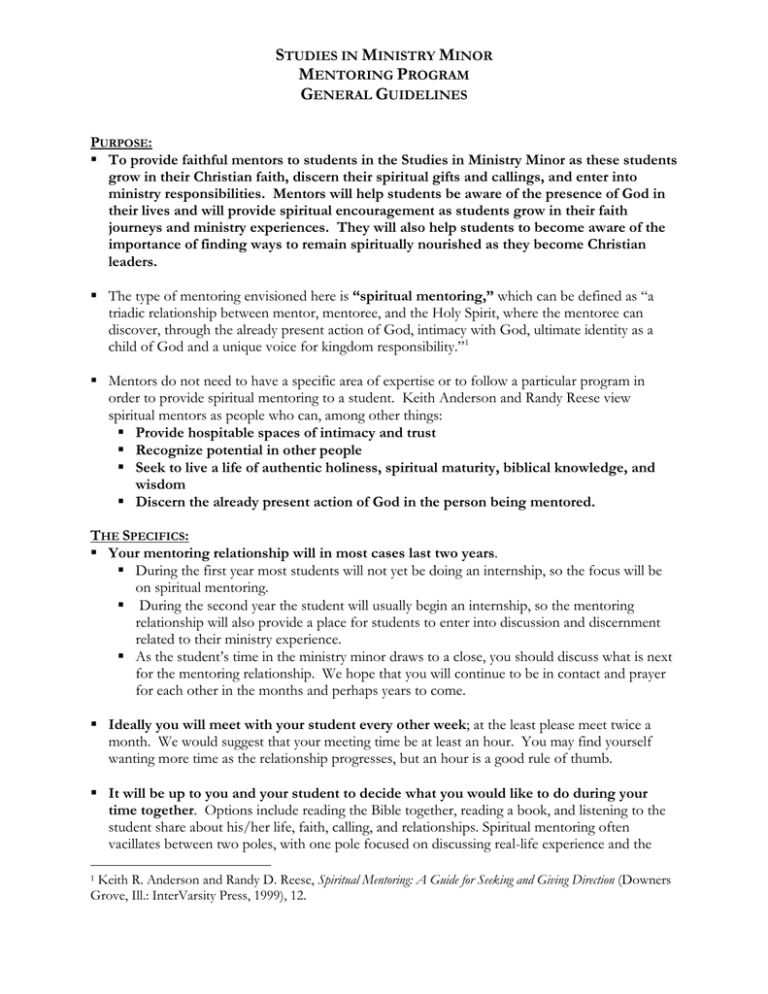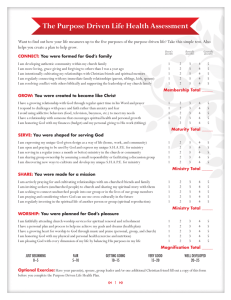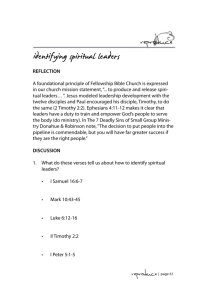S M P
advertisement

STUDIES IN MINISTRY MINOR MENTORING PROGRAM GENERAL GUIDELINES PURPOSE: To provide faithful mentors to students in the Studies in Ministry Minor as these students grow in their Christian faith, discern their spiritual gifts and callings, and enter into ministry responsibilities. Mentors will help students be aware of the presence of God in their lives and will provide spiritual encouragement as students grow in their faith journeys and ministry experiences. They will also help students to become aware of the importance of finding ways to remain spiritually nourished as they become Christian leaders. The type of mentoring envisioned here is “spiritual mentoring,” which can be defined as “a triadic relationship between mentor, mentoree, and the Holy Spirit, where the mentoree can discover, through the already present action of God, intimacy with God, ultimate identity as a child of God and a unique voice for kingdom responsibility.”1 Mentors do not need to have a specific area of expertise or to follow a particular program in order to provide spiritual mentoring to a student. Keith Anderson and Randy Reese view spiritual mentors as people who can, among other things: Provide hospitable spaces of intimacy and trust Recognize potential in other people Seek to live a life of authentic holiness, spiritual maturity, biblical knowledge, and wisdom Discern the already present action of God in the person being mentored. THE SPECIFICS: Your mentoring relationship will in most cases last two years. During the first year most students will not yet be doing an internship, so the focus will be on spiritual mentoring. During the second year the student will usually begin an internship, so the mentoring relationship will also provide a place for students to enter into discussion and discernment related to their ministry experience. As the student’s time in the ministry minor draws to a close, you should discuss what is next for the mentoring relationship. We hope that you will continue to be in contact and prayer for each other in the months and perhaps years to come. Ideally you will meet with your student every other week; at the least please meet twice a month. We would suggest that your meeting time be at least an hour. You may find yourself wanting more time as the relationship progresses, but an hour is a good rule of thumb. It will be up to you and your student to decide what you would like to do during your time together. Options include reading the Bible together, reading a book, and listening to the student share about his/her life, faith, calling, and relationships. Spiritual mentoring often vacillates between two poles, with one pole focused on discussing real-life experience and the Keith R. Anderson and Randy D. Reese, Spiritual Mentoring: A Guide for Seeking and Giving Direction (Downers Grove, Ill.: InterVarsity Press, 1999), 12. 1 other pole focused on being biblically-grounded. It would be great for you and your mentee to find a way to bring these two poles together, so that you are processing and discussing reallife experiences while incorporating Scripture and other Christian resources. We would like you and your student to consider practicing spiritual disciplines together throughout your relationship. We suggest that you begin with one of the four for which we have provided guidelines (see enclosed sheets). We recommend practicing each one for 1-2 months, as it can take time to see the fruit of this kind of spiritual practice. See the enclosed suggested reading list for some resources to further explore spiritual disciplines. We would also encourage you to incorporate prayer into your meetings together. The student will likely welcome your prayers for him/her and find that especially encouraging. He/she may also want to pray with and for you. Regardless of how you decide to pray during your times together, we’d love for you to be regularly praying for your student. Some of you will be mentoring students who are beginning year-long ministry internships. If that is true of your student, you will want to make sure to include space for reflection on your student’s ministry experience along with the other goals you are pursuing in your mentoring relationship. The student will be creating a “Learning Covenant” and be keeping a “Ministry Journal” as part of the internship course that can provide focus for your discussion. (The student will also be discussing his/her internship in the capstone seminar course of the ministry minor, so you will not provide the only outlet for this discussion. Nevertheless, it will be important for you to provide space for the student to process what he/she is learning about ministry and his/her own spiritual gifts and callings, along with the frustrations and joys that come with working with others.) WHAT TO DO IF: A student is not committed to the mentoring relationship: If a student is not in touch with you or will not return your phone calls or emails, please let Susanna know. We will follow up with the student to find out what is going on. Likewise, if a student is showing up to meetings but is clearly not invested in the relationship, let Susanna know and we’ll connect with the student directly. You and the student are clearly not connecting: If, over a series of meetings, you become aware that you and your mentee are not connecting, please feel free to contact Susanna. We want this to be a fruitful relationship for you and the student. It obviously takes time for a relationship of this kind to develop, but if it becomes clear that you and the student are not able to get along or connect, then we will probe alternate arrangements. A serious issue arises involving the mental and/or physical health of your mentee: Contact Susanna right away so she can be aware of the situation and determine if someone within Hope’s Counseling Center needs to be notified. If you cannot reach Susanna and the situation could be considered a crisis, contact Andy McCoy 616.395.7320 (Director for Ministry Studies) or please call the Hope College operator and you will be connected to the counselor on call: 616.395.7770. 2 Your student discerns that he/she is no longer called to ministry: Through the process of going through this minor, many students will likely discern that fulltime, paid ministry is not for them. We do not view this as a failure. To the contrary, we have helped them discover this before they have shaped their future around ministry and invested in the relationships that go along with full-time ministry work. We also do not believe that students need to drop the ministry minor if they are no longer sensing a call to ministry. It can still provide a place for them to learn about their faith and their spiritual gifts and to become equipped to serve the Church as laypeople. FOLLOW-UP CONTACT: We will be following up with you over the course of the semester and year to make sure your mentoring relationship is going well and to learn of any areas in which we could be providing help to you. In addition, we will ask you to provide us with written feedback towards the end of the first semester to see if any improvements need to be made for next semester. At that time we will also find out from you if a meeting at the start of the spring semester would be helpful. Meanwhile please feel free to contact: Susanna Leche Coordinator of Mentoring & Internships 616.395.7326 leche@hope.edu We loved you so much that we were delighted to share with you not only the gospel of God but our lives as well, because you had become so dear to us….For you know that we dealt with each of you as a father deals with his own children, encouraging, comforting and urging you to live lives worthy of God, who calls you into his kingdom and glory. 1 Thessalonians 2: 8, 11-12 3







